- Apr
- 20
- 2023
Psychedelic Assisted Therapy Min-Series Part 3 | Psilocybin-Assisted Therapy: History, Basic Science, Neurophysiology, Clinical Applications, and the Overlap With Spirituality, Meditation, and Transcendence
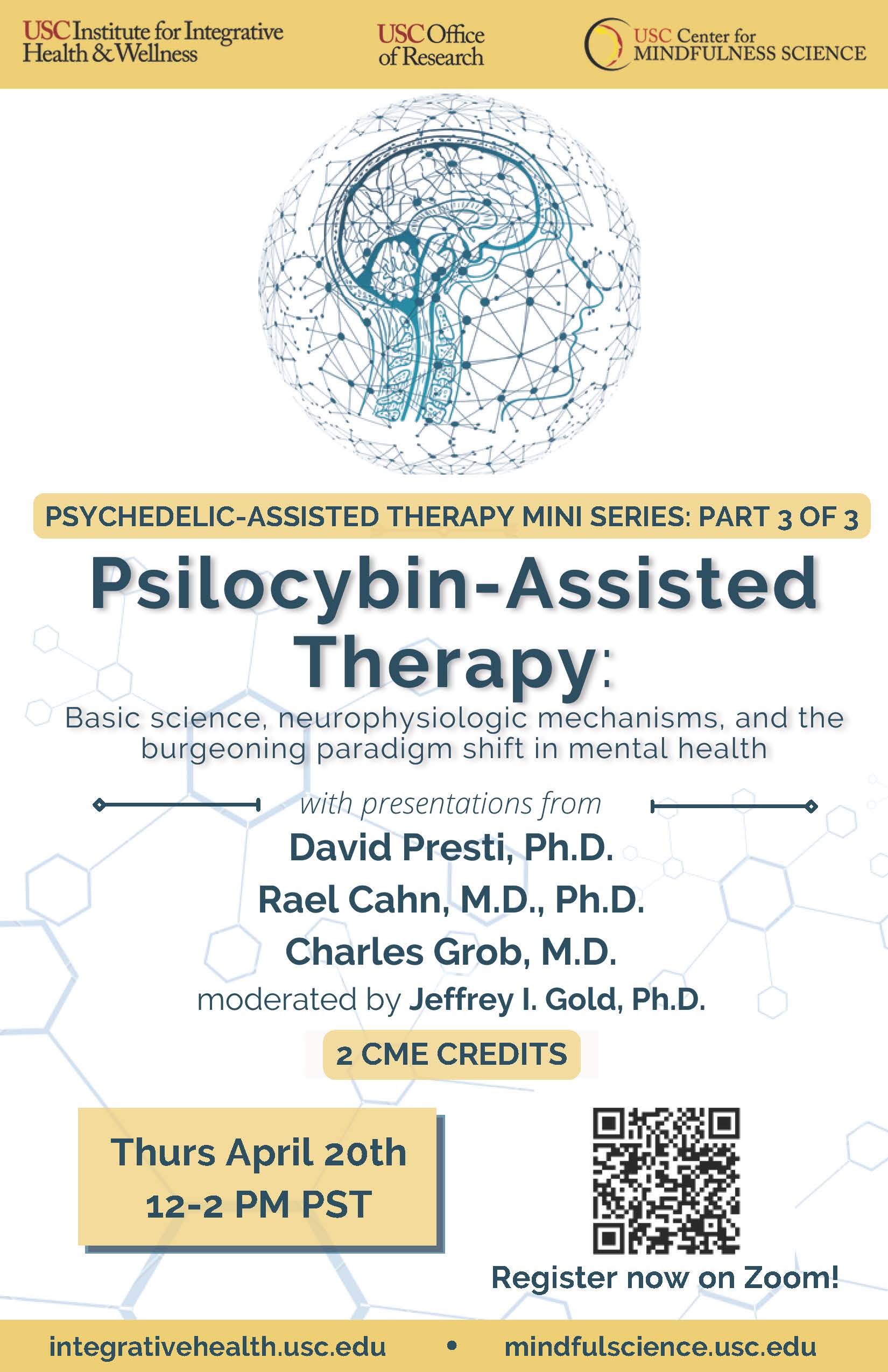
This two-hour presentation will explore the growing scientific terrain and integral nature of psilocybin-assisted therapy. Each speaker will present for approximately 30 minutes with dedicated moderation to allow for an integrated community discussion, including question and answers for the speakers. Dr. Presti will start off the panel presentation, covering the history and mycology of psychedelic mushrooms, their entry into contemporary society, the chemistry and neurobiology of psilocybin and psilocin, and wrap things up by briefly tying together psychedelics, contemplative practice, and the nature of mind and reality. Dr. Cahn will follow, giving an overview of the neurophysiological and neural circuit changes evoked by psilocybin and related tryptamine psychedelics. He will then transition to an overview of his studies with psilocybin and mindfulness practice in healthy normal volunteers investigating the changes…
About Speaker
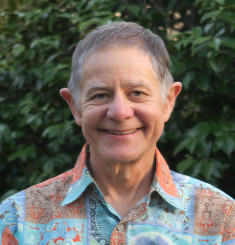
Dr. David Presti, PhD | Speaker
David E. Presti teaches biology, psychology, and cognitive science at the University of California, Berkeley, where he has been on the faculty in molecular and cell biology for more than 30 years. For more than a decade he worked in the clinical treatment of addiction and of post-traumatic-stress disorder at the Department of Veterans Affairs Medical Center in San Francisco. And for the past 20 years, he has been teaching neuroscience and conversing about science with Tibetan Buddhist monastics in India, Bhutan, and Nepal. He has doctorates in molecular biology and biophysics from Caltech, and in clinical psychology from the University of Oregon, and is author of Foundational Concepts in Neuroscience: A Brain-Mind Odyssey (Norton, 2016) and of Mind Beyond Brain: Buddhism, Science, and the Paranormal (Columbia, 2018).
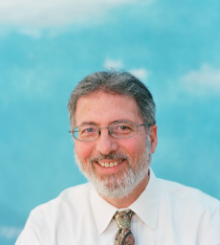
Dr. Charles Grob, MD | Speaker
Charles S. Grob, M.D. is Professor of Psychiatry and Pediatrics at the UCLA School of Medicine and the Director of the Division of Child and Adolescent Psychiatry at the Harbor-UCLA Medical Center. He previously held faculty positions at the Johns Hopkins School of Medicine and the University of California at Irvine. He has conducted approved clinical research with psychedelics since the early 1990s. From 2004-2008 he was the Principal Investigator of the first study in several decades to examine the use of a psilocybin treatment model for patients with advanced-cancer anxiety. He has also conducted research into the range of effects of MDMA, in both normal volunteers and in a selected subject population of adult autistics with severe social anxiety. And, he has conducted a series of ayahuasca research studies in Brazil. Over the last thirty years Dr. Grob has published numerous articles and chapters on psychedelics in the medical and psychiatric literatures and he is the editor of Hallucinogens: A Reader (Putnam/Tarcher, 2002), co-editor (with Roger Walsh) of Higher Wisdom: Eminent Elders Explore the Continuing Impact of Psychedelics (SUNY Press, 2005) and co-editor (with James Grigsby) of the recently published Handbook of Medical Hallucinogens (Guilford Press, 2021). He is a founding board member of the Heffter Research Institute.
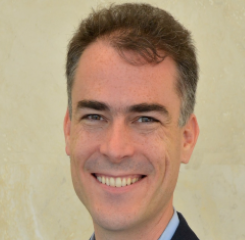
Dr. Rael Cahn, MD, PhD | Speaker
Baruch Rael Cahn, MD, PhD, is Clinical Associate Professor of Psychiatry with the USC Department of Psychiatry and directs the USC Center for Mindfulness Science as well as his lab at the USC Brain and Creativity Institute. Broadly, his lab is focused on neurophenomenology and integrative psychiatry and current studies are focused on investigating the efficacy of meditative practices for personal development as well as psychological distress and the neurophysiologic changes underlying clinical efficacy of meditation and mindfulness for depression, anxiety and substance use disorders. One specific focus of his current meditation research regards the neural correlates to a) transformation of the experience of self and b) narrative-free awareness. He is also investigating the epigenetic basis to MDMA Assisted therapy for PTSD in collaboration with the MAPS Phase III trial of MDMA Assisted Therapy and is now starting a study evaluating the clinical efficacy of a novel ketamine-assisted mindfulness training program for treatment resistant depression at LAC+USC Medical Center. He has a long-term interest in developing and investigating psychedelic-assisted mindfulness training programs for depression, PTSD, anxiety, substance use disorders, and personal development.
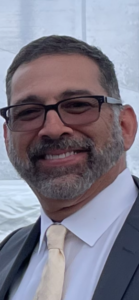
JEFFREY I. GOLD, PHD | Moderator
Jeffrey I. Gold, PhD, is a Professor in the Departments of Anesthesiology, Pediatrics, and Psychiatry & Behavioral Sciences at the Keck School of Medicine, University of Southern California. Dr. Gold, a licensed clinical psychologist, Director Emeritus and Founder of the Pediatric Pain Management Clinic within the comprehensive interdisciplinary Pain Medicine Division in the Department of Anesthesiology Critical Care Medicine. He is the director of the Biobehavioral Pain Lab, Director and co-founder of the USC Institute for Integrative Health & Wellness, Chair for the Institutional Review Board (IRB) at the Saban Research Institute at Children’s Hospital Los Angeles, and faculty within the Pediatric Psychology specialization at Children’s Hospital Los Angeles.
Dr. Gold has specialized in the assessment, treatment, and clinical investigation of acute and chronic pain and other health outcomes (e.g., health-related quality of life, PTSD) in children, adolescents, and adults with various chronic medical illnesses and chronic pain conditions. After graduating with his doctoral degree in clinical psychology (1999), Dr. Gold completed a research fellowship at the National Center for Posttraumatic Stress in Boston and later a clinical post-doctoral fellowship in the Departments of Hematology/Oncology and Psychiatry at the UCSF Benioff Children’s Hospital Oakland.
Dr. Gold is actively engaged in the evaluation and utility of digital therapeutics (i.e., virtual reality, digital mobile applications, virtual care) focused on patients and their families and healthcare providers targeting health and mental health outcomes (i.e., reducing stress, pain, anxiety, psychological distress), while increasing comfort, satisfaction, and overall positive health outcomes and wellness.
